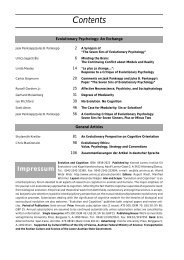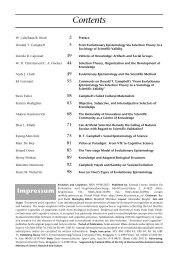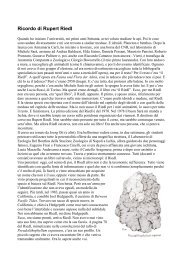Contents - Konrad Lorenz Institute
Contents - Konrad Lorenz Institute
Contents - Konrad Lorenz Institute
Create successful ePaper yourself
Turn your PDF publications into a flip-book with our unique Google optimized e-Paper software.
Gestalt Experiments and Inductive Observations<br />
lation of observation and experiment (ALLEN, forthcoming).<br />
LORENZ’s achievement is to make clear that<br />
we need to have an account of the cognitive mechanisms<br />
that are at work in observation to generate<br />
scientific knowledge.<br />
Acknowledgments<br />
I am indebted to Paul GRIFFITHS, Werner CALLEBAUT,<br />
Wolfgang SCHLEIDT and Manfred WIMMER for helpful<br />
discussions on my work.<br />
Notes<br />
1 See BURKHARDT (1999) for a historical comparison of the<br />
ways animals and behavior was studied (in museums, in<br />
zoos, and in the field) and how this related to and influenced<br />
research approaches. BURKHARDT (2003) compares<br />
the research practices of LORENZ and TINBERGEN.<br />
2 The correspondence between <strong>Konrad</strong> LORENZ and Erwin<br />
STRESEMANN is archived at the Staatsbibliothek zu Berlin,<br />
Preußischer Kulturbesitz (Germany) as ‘Nachlaß 150 (E.<br />
STRESEMANN), Kasten 40’. Any letter from LORENZ that is part<br />
of this source is referred to in the paper as ‘LORENZ, letter to<br />
STRESEMANN’. The letter quoted from above is not dated (it<br />
is probably from the end of 1933), ‘Blatt 94–97’ refers the<br />
sheet numbers given by the archive.<br />
3 Some of LORENZ’s views on epistemology and philosophy<br />
of science—in particular as formulated in the Russian<br />
Manuscript—might appear naive, given the fact that there<br />
were much more sophisticated approaches to these topics.<br />
At the same time LORENZ developed his philosophical<br />
views in the pre-war period in Vienna, philosophers and<br />
scientists that were members of the Vienna circle or associated<br />
with it developed detailed accounts as to how understand<br />
scientific rationality and the justification of<br />
empirical knowledge. LORENZ did not pay attention to<br />
these developments probably because he and the members<br />
of the Vienna circle belonged to different philosophical,<br />
scientific, and social-political communities. I will later on<br />
point to some useful features of LORENZ’s epistemological<br />
framework.<br />
4 Both were of the same age and working on their Habilitation<br />
theses at the University of Vienna. While BRUNSWIK<br />
was Karl BÜHLER’s assistant, LORENZ took his psychology<br />
classes with BÜHLER. BRUNSWIK gave LORENZ comments on<br />
the Companion (LORENZ 1935) as regards issues dealing<br />
with the psychology of perception (LORENZ, letter to STRE-<br />
SEMANN, November 21, 1934). See HOFER (2001) for a discussion<br />
of the personal and intellectual relationship between<br />
BÜHLER, BRUNSWIK, and LORENZ.<br />
5 It is not quite clear what LORENZ means by saying that the<br />
Gestalt is just subjective. Gestalt psychologists often assumed<br />
that Gestalt perception aims at objective features of<br />
the world (see ASH 1998) and LORENZ does not seem to disagree<br />
with this in general.<br />
6 In a letter from 1936 LORENZ complains that so many physiological<br />
chemists are incapable of viewing animals as organic<br />
entireties (“Ich kenne aber so viele Physiologische<br />
Chemiker, die alle ganz unfähig sind, im Tier eine organische<br />
Ganzheit zu sehen”, LORENZ, letter to STRESEMANN, October<br />
4, 1936).<br />
7 The use of three kinds of justificatory arrows in the diagram<br />
is a rough classification. A more detailed and qualified account<br />
can be found in the above discussion. Note for instance<br />
that an arrow justifying the observational approach<br />
refers to some subset of the features peculiar to the observational<br />
approach.<br />
References<br />
Allen, C. (forthcoming) Is anyone a cognitive ethologists Biology<br />
and Philosophy.<br />
Ash, M. G. (1998) Gestalt Psychology in German Culture<br />
1890–1967: Holism and the Quest for Objectivity. Cambridge<br />
University Press: Cambridge.<br />
Brunswik, E. (1934) Wahrnehmung und Gegenstandswelt:<br />
Grundlegung einer Psychologie vom Gegenstande her.<br />
Franz Deuticke: Leipzig.<br />
Brunswik, E. (1937) Psychology as a science of objective relations.<br />
Philosophy of Science 4: 227–260.<br />
Brunswik, E. (1952) The Conceptual Framework of Psychology.<br />
Chicago University Press: Chicago.<br />
Brunswik, E. (1955) ‘Ratiomorphic’ models of perception and<br />
thinking. Acta Psychologica 11: 108–109.<br />
Burkhardt, R. W. (1981) On the emergence of ethology as a<br />
scientific discipline. Conspectus of History 1: 62–81.<br />
Burkhardt, R. W. (1999) Ethology, natural history, the life sciences,<br />
and the problem of place. Journal of the History of<br />
Biology 32: 489–508.<br />
Burkhardt, R. W. (2003) <strong>Konrad</strong> <strong>Lorenz</strong>, Niko Tinbergen, and<br />
the founding of ethology as a scientific discipline. In:<br />
Legakis A./Sfenthourakis S./Polymeni R./Thessalou-Legaki<br />
M. (eds) The New Panorama of Animal Evolution: Proceedings<br />
of the 18th International Congress of Zoology. Pensoft:<br />
Sofia, pp. 329–336.<br />
Burkhardt, R. W. (forthcoming) Patterns of Behavior: <strong>Konrad</strong><br />
<strong>Lorenz</strong>, Niko Tinbergen, and the Founding of Ethology.<br />
Chicago University Press: Chicago.<br />
Dewsbury, D. A. (1988) A brief history of the study of animal<br />
behavior in North America. In: Bateson P. P. G./Klopfer P.<br />
H. (eds) Perspectives in Ethology. Volume 8: Whither<br />
Ethology Plenum Press: New York, pp. 85–122.<br />
Heinroth, O./Heinroth, M. (1924–1933) Die Vögel Mitteleuropas,<br />
in allen Lebens- und Entwicklungsstufen photographisch<br />
aufgenommen und in ihrem Seelenleben bei der<br />
Aufzucht vom Ei ab beobachtet. 4 volumes. Hugo Bermüller:<br />
Berlin.<br />
Helmholtz, H. (1925) Treatise on Physiological Optics. The<br />
Optical Society of America. Ithaca: New York.<br />
Hofer, V. (2001) <strong>Konrad</strong> <strong>Lorenz</strong> als Schüler von Karl Bühler:<br />
Diskussion der neu entdeckten Quellen zu den persönlichen<br />
und inhaltlichen Positionen zwischen Karl, Bühler,<br />
Evolution and Cognition ❘ 169 ❘ 2003, Vol. 9, No. 2








